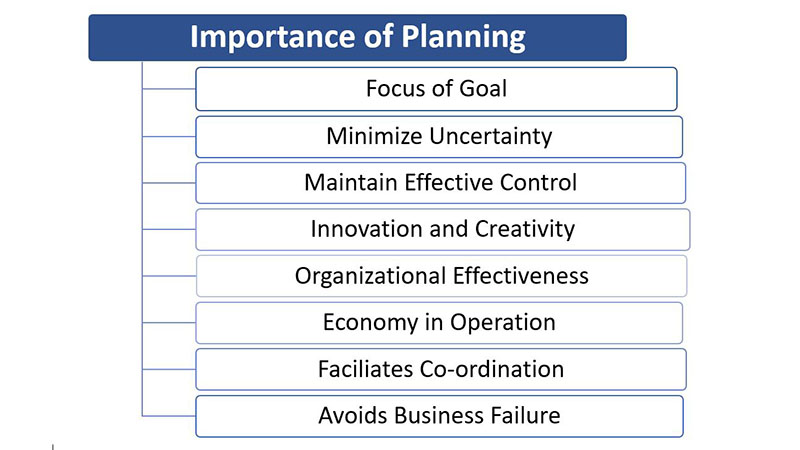Importance of Planning in Principles of Management – Why Planning is Important?
Planning is a primary and inseparable function of management. It is a continuous process tip to the existence of an organization. It ensures smooth performance and the best utilization of resources including manpower. Planning also defines a clear line of action so that wastage of resources can be minimized. There is lots of importance of planning in business.
Planning is the foundation of an organization and a sign of efficient management. It contributes to bringing smoothness in the future course of action. The following are the importance of planning in principles of management:
Importance of Planning – Why Planning is Important?
- Focus of goal
- Minimize uncertainty
- Maintain effective control
- Innovation and creativity
- Organizational effectiveness
- Economy in operation
- Facilitates co-ordination
- Avoids business failure
All the above-mentioned points on why planning is important in principles of management are briefly described below.

1. Focus On Goal
Every organization is established with a definite objective and the activities of the organization concentrate to achieve the defined objectives. The plan helps to draw the attention of the manager and other employees to the same objectives. It defines a clear line of action and the responsibility of all levels of management. It also eliminates confusion and haphazard activities. It facilitates bringing units in action and coordination among all the units of works. Therefore, good planning is a sign of management by objectives.
2. Minimize Uncertainty
Planning is a must to minimize future risks and uncertainty. It involves forecasting and anticipating future uncertainty and changes. It is well known that the future is uncertain and changeable. So every organization has to perform its activities within the changing environment of society. Planning estimates anticipated future changes and makes necessary provisions to overcome such changes.
3. Maintain Effective Control
Planning is the basis of control. It determines the standard of work to be performed. Management provides instruction and guidance to the work on the basis of a plan. It helps to compare actual performance with that of planned performance. It also helps to identify the deviation between planned and actual performance. Control without planning is not possible. However, planning makes control effective and meaningful.
4. Innovation And Creativity
As an intellectual exercise, planning encourages innovative thought and creative action among the managers. An effective plan forces managers to think about the best objective and best alternative course of action. This is a must to grow and expand business activities. It contributes to motivating and developing morale among the employees. It is also essential to maintain an up-to-date position in business operations and face business complexity. Thus a sound plan contributes to developing innovative ideas and creative action.
5. Organizational Effectiveness
Planning helps eliminate wastage and utilize available resources in the best possible way. It leads to maximize productivity and minimizing the cost of output. Planning is the foundation for the successful completion of organizational activities. It makes all the organizational activities more efficient and effective. Therefore, sound planning contributes to minimizing the cost of production and developing organizational effectiveness.
6. Economy in Operation
Planning avoids the concept of trial and error or hit or miss or random activity. It selects a course of action, which is beneficial from the organizational point of view. It defines a clear line of action for all levels of management. It helps to bring a system in the organization which ultimately contributes to developing the working efficiency of all members.
7. Facilitates Coordination
Planning is a primary function, which maintains coordination with other functions of management. It clearly defines objectives and strategies to be achieved and brings other functions of management in action. It also plays an important role to maintain close relationships among all the departments. This is necessary to develop a feeling of team spirit among all the members of the organization.
8. Avoids Business Failure
The basic motive of planning is to overcome the possibility of business failure. The primary task of the planning process is to select the best course of action among many alternatives. Besides, it also defines a clear line of action for every member. It helps to maintain unity in action, better coordination among all the members of the organization. It minimizes uncertainty and risk in performance and also wastage of organizational resources. Ultimately, it contributes to maximize productivity and minimize the cost of output.
So, the above-mentioned was the importance of planning in principles of management.
Read More:
